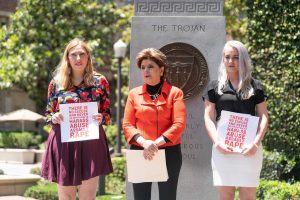Attorneys, patients react to George Tyndall’s license suspension

(From left to right) Ariel Sobel, Gloria Allred and Viva Symanski participated in the Justice for Trojans march in June to protest George Tyndall’s alleged misconduct and the University’s lack of transparency. (Daily Trojan file photo)
Following the Medical Board of California’s decision to temporarily suspend former USC gynecologist George Tyndall’s medical license, attorneys suing the doctor and the University lauded the Board for its decision to keep him from seeing patients.
In May, Tyndall was accused of sexual abusing patients during gynecology appointments at the student health center for several decades. Most recently, he agreed to the interim suspension of his medical license, rather than waiting for a full hearing on Friday. This temporary suspension will last until the Medical Board issues a final decision regarding his license, according to legal documents.
Tyndall’s attorney Peter Osinoff did not respond to multiple requests for comment.
Lawyers such as John Manly, who defended gymnasts abused by U.S. Olympic doctor Larry Nasser, and Gloria Allred, a prominent lawyer known for defending high-profile women in similar cases, are now representing hundreds of women in suits against the University and Tyndall.
Both were supportive of the decision to bar his license.
“I’m glad he’s off the street in terms of practicing medicine, but it’s very, very sad that it took over 30 years, and, at this point, over 400 women have come forward to report that they were assaulted or harassed by him,” Manly said.
Daniella Mohazab, a graduate student and alleged victim of Tyndall, said at a press conference that she “cried tears of happiness and relief” when she found out about Tyndall’s medical license suspension.
“In the past few weeks, I have continued to hurt,” she said. “This has not been an easy process, but our work is paying off.”
With the suspension, Tyndall is unable to practice medicine, advertise himself as a physician or supervise physician assistants while the order is in effect. He is also barred from prescribing medication.
“The medical board doesn’t suspend your license unless they suspect you did something wrong,” Manly said. “The notion that this is all a big misunderstanding, I think that’s out the window.”
Tyndall was also required to turn in his wall and wallet certificates along with prescriptions blanks and Drug Enforcement Agency order forms and permits, according to the documents.
A brief from the California Attorney General’s office that argued for the suspension of Tyndall’s medical license included declarations from five students who are clients of Allred. The women shared information about the alleged sexual misconduct they experienced with Tyndall. Mohazab and Anika Narayanan were two of those who spoke out.
“I am so encouraged by this recent decision and have nothing but pride and gratitude for every person who has been a participant in this narrative, Narayanan said. “Each and every woman who is linked by this shared experience and each and every person who listened to us and appreciated this experience as serious, wrong and perhaps most critically, valid.”
On Wednesday, The New York Times reported that Secretary of Education Betsy DeVos is preparing new policies regarding sexual misconduct on campuses. The new policies aim to narrow the definition of sexual harassment so that schools are only held accountable for formal complaints and instances that occur on campus. There will also be higher legal standards to evaluate whether universities address complaints properly, the Times reported.
USC did not respond regarding these new rules by time of publication. However, Board of Trustees Chair Rick Caruso addressed how the University is currently dealing with accusations of misconduct against Tyndall in an interview Tuesday.
“The University is responding to the lawsuits that have been filed,” he said. “I feel strongly that these are our students, they are patients. We need to do right by them and treat them fairly and through this process of the lawsuit, this is going to be our goal. Get this chapter of their life and the University’s life closed.”
Tomás Mier contributed to this report.
